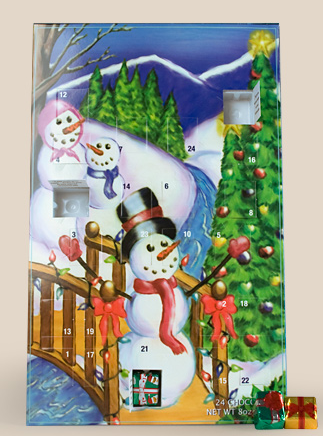 The other day my 15 year old son asked if I had purchased his advent calendar yet. “You know, the ones with the little chocolates,” he reminded me.
The other day my 15 year old son asked if I had purchased his advent calendar yet. “You know, the ones with the little chocolates,” he reminded me.
I hadn’t planned to get any this year as I wrongly assumed he’d outgrown it. In that moment, I realized he hadn’t. It was a tradition that signaled the start of his Christmas season.
Tradition has been a recurring theme in my life this month and not just because I will be initiating new family traditions as a single mother.
Not all traditions are events that surround well-known holidays. Traditions can be personal and private as well.
When my grandmother was married during WWII, she unknowingly began a family tradition. Her bouquet consisted of pink roses wired inside the openings of white gladiolas. My mother carried a similar bouquet on her wedding day in 1964, as did I when I married in 1990. My friend who had also been my Maid of Honour thought the bouquet was beautiful and chose to incorporate the same flowers for her mother’s funeral. She knew it would be special to me.
Definition of Tradition
Dictionary.com defines tradition as:
-noun
1. the handing down of statements, beliefs, legends, customs, information, etc., from generation to generation, esp. by word of mouth or by practice: a story that has come down to us by popular tradition.
2. something that is handed down: the traditions of the Eskimos.
3. a long-established or inherited way of thinking or acting: The rebellious students wanted to break with tradition.
4. a continuing pattern of culture beliefs or practices.
5. a customary or characteristic method or manner: The winner took a victory lap in the usual track tradition.
6. Theology.
a. (among Jews) body of laws and doctrines, or any one of them, held to have been received from Moses and originally handed down orally from generation to generation.
b. (among Christians) a body of teachings, or any one of them, held to have been delivered by Christ and His apostles but not originally committed to writing.
c. (among Muslims) a hadith.
7. Law . an act of handing over something to another, esp. in a formal legal manner; delivery; transfer.
Purpose of Tradition
Tradition allows us to know what to expect. It’s a social or emotional roadmap with roots based in history.
Tradition allows us to signify the importance of an occasion. Sometimes it’s an outward display such as marriage or communion, other times it’s an internal event. Mostly, it’s both.
Breaking with Tradition
When tradition is firmly steeped in someone’s life, choosing to break with it may require an event just as significant as the tradition itself. This past weekend I attended a “burning.” A friend needed a symbolic event to move from married to single life. He did so by burning chosen items that represented the challenges resulting in his marriage’s demise. It was an emotional clearing of traditional vows that had kept him in an unhappy union far too long.
New Traditions
We’ll be breaking with tradition this holiday season in many ways. I won’t be cooking Christmas Eve dinner or opening Christmas eve presents with my children because they’ll be at their father’s house. Instead, I’ll resurrect a new/old family tradition and cook on Christmas Day in anticipation of their arrival. I’m excited about the possibility of creating new traditions especially since my children are now old enough to be actively involved in the process.
I ordered the Advent Calendars today. There are some traditions worth keeping.

